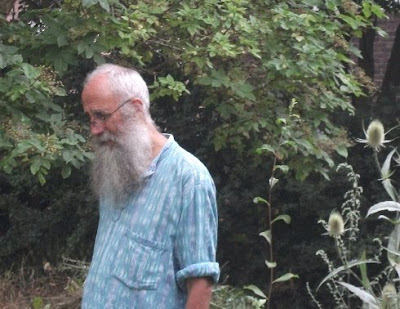We gave Sarah two bags of crab apples and hope to get a report back of the relative merits of each variety for culinary use. Her blog is the first we have added to ours and I hope we will be of mutual benefit. We grow it, she cooks it!
Inside The Secret Garden
a haven for wildlife and veg plots in the middle of an inner-city estate
Sunday, 1 August 2010
Mudpies & Minestrone
While the Secret Garden was heaving with volunteers, transforming the paths and veg plots, in the Community Centre Sarah Moore was giving cookery demonstrations and also preparing the most amazing vat of veg curry and an ovenful of chapatis keeping warm for general consumption.
Friday, 30 July 2010
Quiet enjoyment
Volunteers Day


 Yesterday was a fantastic day for the Secret Garden. A joint effort set up between MHT and Lambeth's brilliant and passionate Green Community Champion, Susan Sheehan. Lots of people, including a jolly band of volunteers who all work in the same department at Price Waterhouse Cooper, pitched in with enthusiasm. Roy Vickery came to help as well as a number of tenants and Metropolitan Housing Trust (MHT) employees and contractors. Other events were being run in the Community Centre by MHT such as a cookery demonstration, debt & employment advice and much more and it was a really successful event. THANK YOU!
Yesterday was a fantastic day for the Secret Garden. A joint effort set up between MHT and Lambeth's brilliant and passionate Green Community Champion, Susan Sheehan. Lots of people, including a jolly band of volunteers who all work in the same department at Price Waterhouse Cooper, pitched in with enthusiasm. Roy Vickery came to help as well as a number of tenants and Metropolitan Housing Trust (MHT) employees and contractors. Other events were being run in the Community Centre by MHT such as a cookery demonstration, debt & employment advice and much more and it was a really successful event. THANK YOU!Wednesday, 28 July 2010
Five-Star invertebrate hotel
 This was made with some local children a couple of years ago. They had really enjoyed the wildlife safaris and it's good to see it's stood the test of time so far.
This was made with some local children a couple of years ago. They had really enjoyed the wildlife safaris and it's good to see it's stood the test of time so far.A fox has been scrabbling about on the bottom left but has done nothing more than dislodge some corrugated cardboard (a snug habitat for overwintering invertebrates).
Tuesday, 27 July 2010
She sits among the cabbages and peas.
What is eating these cabbages?
A close look reveals no caterpillars or caterpillar poo anywhere on the leaves. There are no silvery slug and snail trails on the leaves or surrounding compost. The obvious culprit is a peckish pigeon.

This problem can be easily avoided by making hoops over the plants and then pegging down an old net curtain over the top before any fat pigeon comes waddling along looking for a nice fresh bit of salad.



You can see little white specks on the leaves. These are the shed skins of aphids who have got so fat on delicious easy to reach pea tangle they've split their skins and grown a new one. In the top half of the picture you can see the red and black crocodilian larva of a Harlequin ladybird. Although they eat aphids they also eat native British ladybirds.
The beginnings of our orchard

This is looking at the westward, wild end of the garden. The tree in the foreground is an unknown variety of Crab apple.

In summer the apples start to change from green to a deep red. By autumn the ground is littered with golfball-sized vivid crimson fruit with
quite dry, powdery flesh.
We want to plant lots of different apple varieties against the warmth of the brick walls around the garden. As we have two good Crab apples, we have pollinators in situ already.
Measuring the marigolds
Today we are doing a biodiversity audit in the garden. I am using the Flora-for-Fauna Postcode Plants Database which is a record of all species recorded historically in the local area. We shall cross off any plants that can still be found and add any others.

A lot of planting (and new building work around the edges) has happened since this aerial view was taken. The pond and its edges are completely planted up with native plants and the whole area is alive with frogs.
A wonderfully knowledgeable man called Roy came with a more useful and somewhat simplified list but was impressed with what he saw and named some things for us that we were stumped about.
UPDATE: The wonderfully knowledgeable man is Roy Vickery. He was Curator of Flowering Plants at the Natural History Museum from 1965 until his retirement. He has also written books on plant lore, one of which, The Oxford Dictionary of Plant Lore, is in my hand at this very moment and is not only erudite but also very entertaining.


This is his new book which will be out in September 2010.
Subscribe to:
Comments (Atom)





